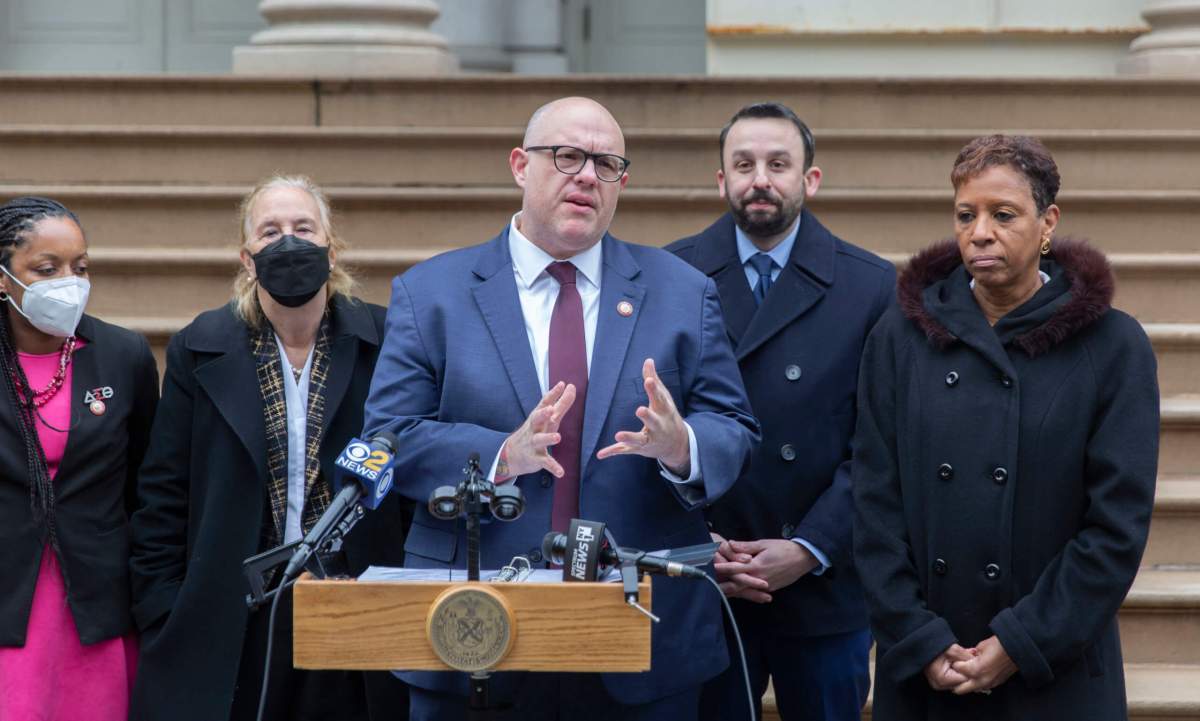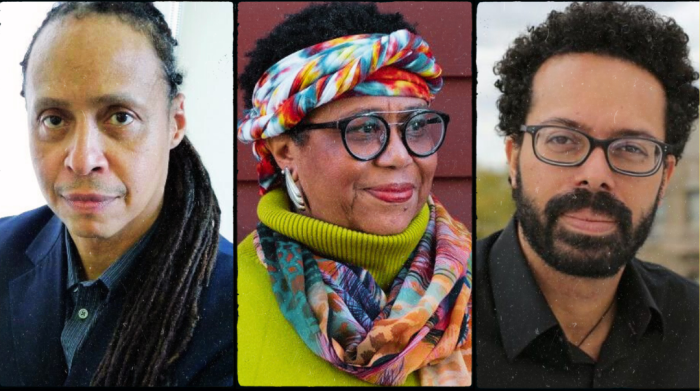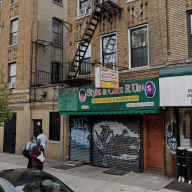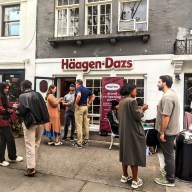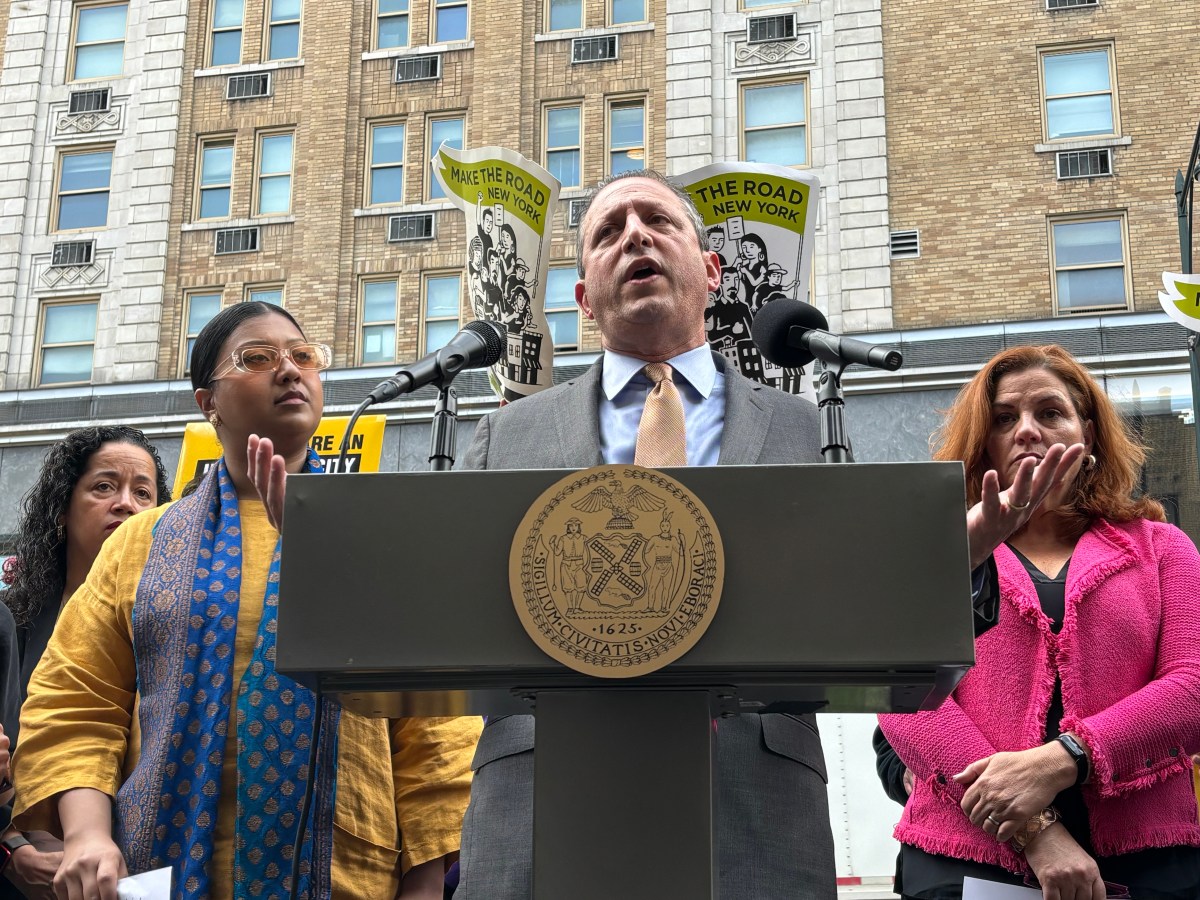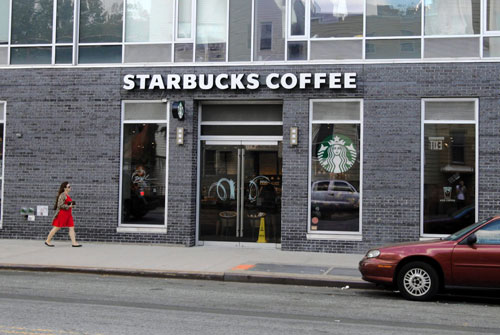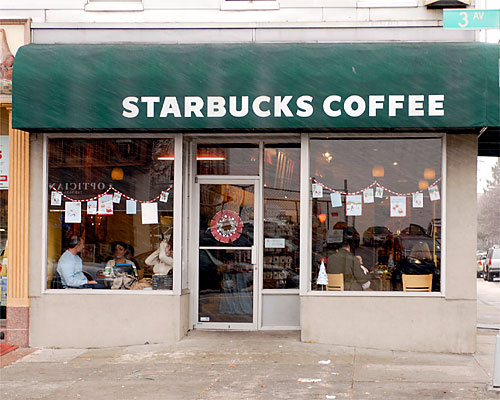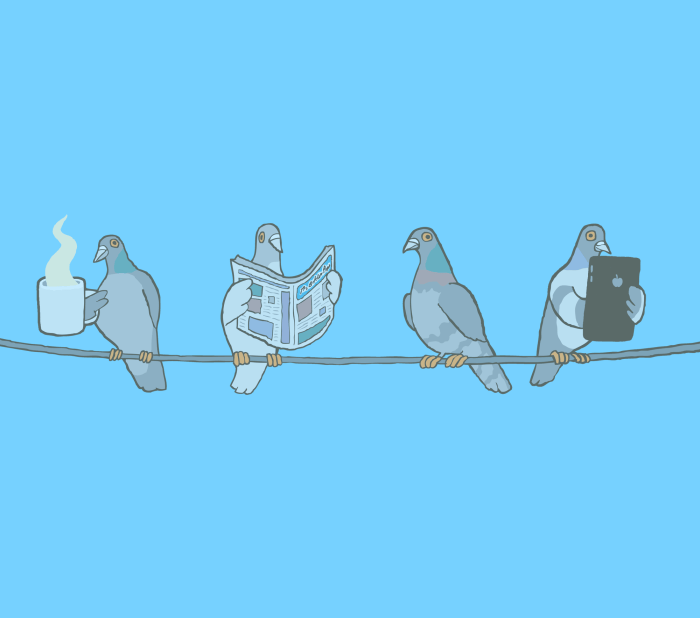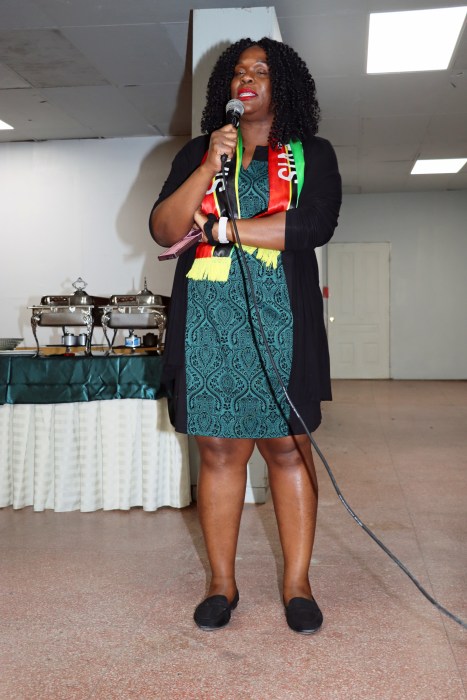Employees at the Starbucks in Bath Beach’s Ceasar’s Bay Shopping Center will begin voting this week on whether to become the coffee giant’s first unionized location in Brooklyn, and local Councilmember Justin Brannan is warning CEO Howard Schultz against tall, grande, or venti interference in workers’ right to organize after various attempts at union-busting in the southern Brooklyn cafe.
Twenty-one employees — “partners” per Starbucks company lingo — at the southern Brooklyn Starbucks outlet will begin voting Friday on whether to unionize with Starbucks Workers United, a Service Employees International Union affiliate that has, so far, successfully organized ten locations of the ubiquitous Seattle-based coffee shop this year after first unionizing locations in Buffalo, against a pervasive and well-funded opposition campaign from corporate headquarters.
Workers at the Ceasar’s Bay shop announced their intention last month to become one of the first three Starbucks in New York City to unionize, in concert with the Astor Place location in Greenwich Village and the “Reserve Roastery” in the Meatpacking District. Reserve Roastery workers won their union election last week, while ballots have already been sent out at Astor Place. Across the country, 160 stores have filed petition to unionize, and ten have won their elections.
Ceasar’s Bay’s union drive also comes in the wake of one of the labor movement’s biggest victories in years: unionizing thousands of workers at Amazon’s Staten Island fulfillment center.
Brannan, a former shop steward at the American Federation of Television and Radio Artists, said in a letter to Canarsie-native Schultz – who recently returned to the company as interim CEO – that Ceasar’s Bay employees have already faced possible retaliatory measures at the hands of company management over their efforts to unionize, including cuts to their working hours, echoing the experiences of workers at outlets across America as Starbucks aggressively seeks to quell labor organizing among its workforce.
“I’m sorry to say I am deeply troubled by your company’s response to unionizing efforts in Ceasar’s Bay thus far,” Brannan said in the April 4 letter. “Several members of the organizing committee, a majority of which are women of color, have already filed unfair labor practice charges … because they’ve had their hours cut since they started organizing. To the outside observer, these actions certainly appear retaliatory.”
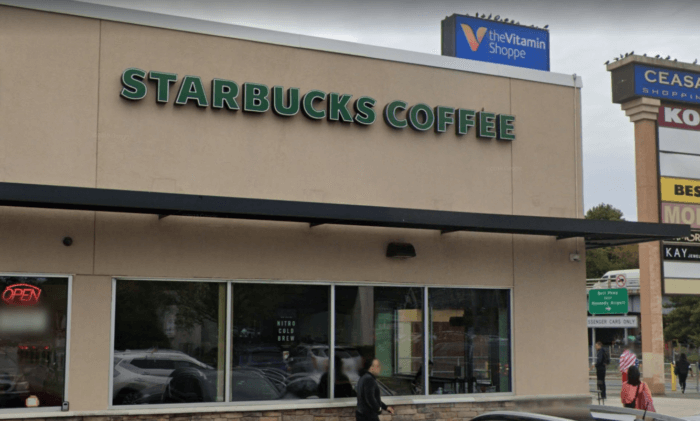
Ceasar’s Bay employees say they have also been subjected to anti-union “captive audience meetings” and one-on-chats anti-union “chats,” a common tactic pressuring them against voting in favor of forming a union, which if successful will bargain for a contract with Starbucks honchos.
Megan DiMotta, a union organizer at the Ceasar’s Bay store and 10-year veteran of the company, said that she and another union organizer have had their hours cut by about 10 percent, which the company justified by onboarding new colleagues the week they filed with the National Labor Relations Board. She said that managers have also been far more likely in recent weeks to discipline workers for minor infractions, and a regional manager came to the store soon after partners filed cards to observe them during the workday, which workers took as a form of intimidation.
The company even closed down the store early several days in a row, DiMotta said, when Ceasar’s Bay was short-staffed due to workers testing positive for COVID. DiMotta said that typically, the company would simply send partners from other stores to fill in, but in the case of Ceasar’s Bay, they may not have wanted organizing employees talking with those from other stores.
“They were claiming it was because of short staff because a couple partners tested positive,” DiMotta said. “And normally they would just send partners from another store to keep the store open, but this time they claimed they could not do that. I was pretty sure they didn’t want us talking to partners from other stores.”
In Buffalo, workers reported that executives had arrived on site to perform labor typically performed by baristas, in what they viewed as an attempt at intimidation. Executives also forced baristas to attend mandatory anti-union meetings and closed down two stores where employees were attempting to organize. Starbucks fired seven employees attempting to unionize in Memphis in February, and on Monday fired an organizer in Phoenix, where the NLRB has accused the company of spying on and threatening union reps.
Dozens of employees have filed complaints in recent months with the NLRB alleging illegal anti-union retaliation at the hands of Starbucks.
A Starbucks spokesperson told Brooklyn Paper that claims of interference in the union’s organizing drive are “categorically false,” and disputed claims of workers’ hours being cut, arguing that schedules are set weeks in advance and store hours are subject to change due to “customer behavior” and seasonal trends.
“We always schedule to what we believe the store needs based on customer behavior. That may mean a change in the hours available, but to say we are cutting hours wouldn’t be accurate,” the spokesperson said. “Any claims of anti-union activity are categorically false. We will fully honor the process laid out by the NLRB and encouraged our partners to exercise their right to vote in the election to have their voice heard.”
The company claims that a union would come “between” workers and make everyone unhappy.
“We are listening and learning from the partners in these stores as we always do across the country,” the spokesperson said. “From the beginning, we’ve been clear in our belief that we are better together as partners, without a union between us, and that conviction has not changed.”
But Starbucks partners argue that the “direct” relationship they currently have with the company has only served to exploit them. Organizers at Ceasar’s Bay say that they are seeking to form a union to combat the company’s paltry wages and hours, and to demand a better response from Starbucks to traumatic harassment that baristas have endured since the start of the pandemic.
Baristas were sometimes threatened or even assaulted throughout the pandemic when they were enforcing masking and vaccination requirements, DiMotta said, but the company did little to nothing to support them. One barista who was assaulted was ultimately fired, she said.
“No matter how many incident reports we filed, we felt we couldn’t get rid of customers that were threatening us, and ultimately led to physical assault of our partners,” DiMotta said, noting that some customers have attempted to start fights with her. “That was an issue for us because we realized our jobs could be at risk at any point and with no protection from physical altercations.”
“I’ve written incident reports once a day at some points, and there was nothing happening,” she continued. “And it was frustrating, my partners were doing the same thing. We need to be able to protect ourselves, and we were protecting ourselves, we were doing everything we could to keep ourselves safe. At that point, why are we not unionizing.”
DiMotta said that the company tries to prevent partners from taking breaks by scheduling shifts with short enough hours that they don’t fall under laws requiring the provision of rest time. After the Buffalo stores unionized, she said the company raised prices without informing partners, leading to verbal altercations between blindsided customers and blindsided employees. “I think unions are kind of the only way for workers to address these issues in a lot of situations,” she said. “It really isn’t fair for companies to tell workers what they need, or what they feel they deserve for their work. I don’t think they know half the time what it is workers go through.”
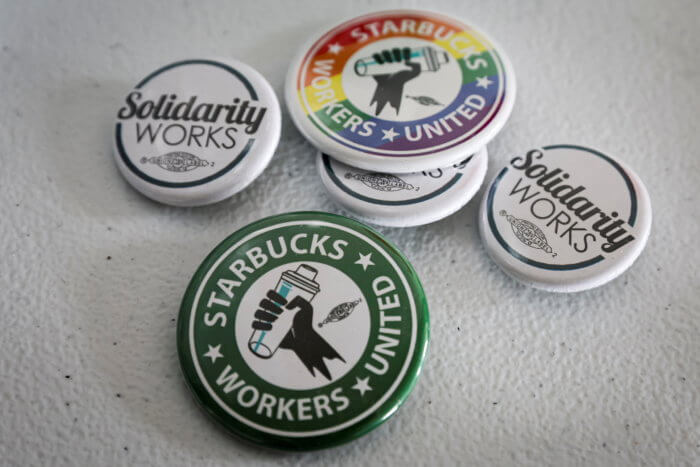
And through it all, DiMotta says that with a decade under her belt with the company, she still struggles to afford her rent even as former CEO Kevin Johnson waved goodbye with a $60 million golden parachute.
“I think what’s happening is a labor movement,” she said. “I work at a company I’ve been at for so long and it’s still so difficult for me to live, pay my bills.”
Schultz, just days into his third tenure as CEO, said in an April 4 town hall with employees said that Starbucks and other “companies throughout the country [are] being assaulted in many ways by the threat of unionization.”
“The people who make decisions about what happens with the store, they’re not in Brooklyn,” DiMotta said. “Half the time they’re in another state!”
In his letter, Brannan urged Schultz — who is worth $4.1 billion according to Forbes — to treat Starbucks workers the same as they call them: partners.
“Starbucks famously calls their employees ‘partners,’ a label meant to symbolize the company’s respectful treatment of all in the workplace,” Brannan wrote. “But the language of partnership means nothing if Starbucks ‘partners’ aren’t treated accordingly. If you truly respect your employees, it is incumbent on you to step aside and let their legally guaranteed process play out organically.”
Union ballots go out to Ceasar’s Bay employees this Friday, April 8, and must be returned within three weeks, by April 29. Instead of interfering, Brannan is encouraging Schultz to purchase a $7 iced latte and feast his eyes upon the glorious union.
“Step aside, end the union-busting, and obey the law,” Brannan said. “Have a cup of coffee, sit back, and watch a beautiful thing happen at your stores – both here in New York City – and across the country.”


